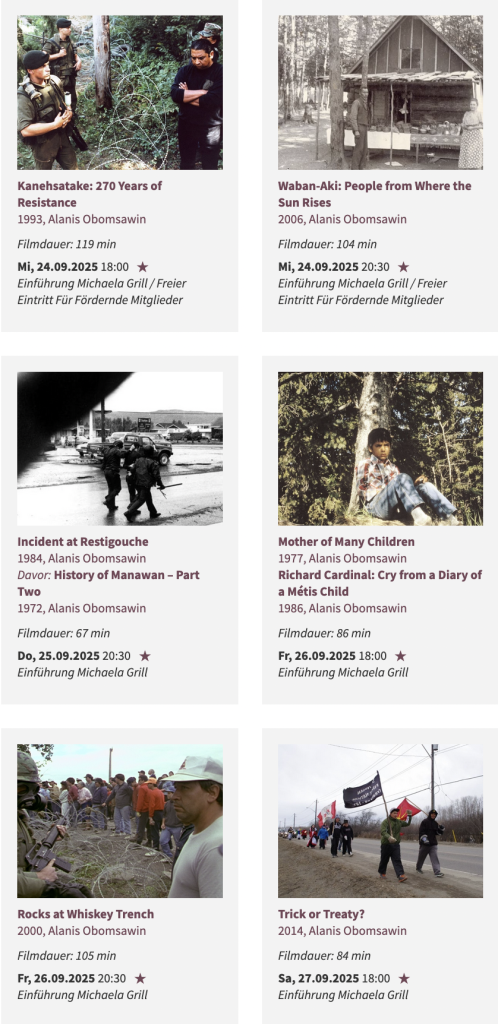September 24-27 at Austrian Filmmuseum Vienna

Alanis Obomsawin is one of Canada’s first and most influential Indigenous filmmakers. As a director, singer and Abenaki Nation activist, she has been shaping documentary storytelling for over five decades – with an unmistakable voice that is uncompromisingly committed to the rights and self-determination of Indigenous communities.
She sees film as a political tool, a means of resistance against colonial narratives, media distortions and the structural exclusion of Indigenous perspectives. At the centre of her work are the stories, struggles and hopes of Indigenous peoples – told from an authentic, inner perspective.
With great consistency, she resists the dominance of Western perspectives and creates spaces in which voices that have all too often been ignored or distorted are heard. Her films are living chronicles of resistance: they not only preserve oral traditions, but also document the ongoing struggle against colonial violence, state repression and the loss of land and cultural identity.
Obomsawin combines indigenous narrative traditions with interviews, music, drawings and archive material to create a powerful tool of resistance, a medium of political intervention that makes social injustices and the ongoing colonization of Indigenous life realities visible.
Her works are indispensable archives of Indigenous memory and formulate an urgent message of resistance.
Wednesday 24.9., 18:00:
Kanehsatake: 270 Years of Resistance (1993, 119min)
In July 1990, a serious conflict broke out in Oka, Québec, between Kanien’kéhaka (Mohawk) demonstrators, the Québec police and the Canadian army. The trigger is the planned construction of a golf course on Indigenous land. After the Kanien’kéhaka erect a barricade to block access to the construction site, the situation escalates. Violent attempts to evict the protesters are intended to end the protest by force. Alanis Obomsawin documented the 78-day conflict from an Indigenous perspective behind the lines. Her film not only sheds light on the specific events, but also places the conflict in a wider context: as an expression of a systemic, ongoing struggle for Indigenous rights. The multi-award-winning work is now considered a milestone in Indigenous filmmaking and a key document of colonial continuities in Canada.
Wednesday 24.9., 20:30:
Waban-Aki: People from Where the Sun Rises (2006, 104min)
Alanis Obomsawin returns to her home village of Odanak, an Abenaki reserve south of the St. Lawrence River in Quebec. In her lyrical portrait, she focuses on the Abenaki community living there and their traditional culture of basket weaving and canoe building. She skillfully interweaves the multifaceted history of her people with a critical reflection on contemporary identity and the so-called “status” that legally defines Indigenous belonging. The colonial Indian Act stipulates that children of Indigenous origin can lose their status – and thus their official rights – if their parents marry outside the community. A poetic portrait of the complex past and present of the Abenaki, who once inhabited large parts of what is now New England, the Canadian Maritimes and south-eastern Quebec.
Thursday 25.9, 20:30:
History of Manawan – Part Two (1972, 21min) / Incident at Restigouche (1984, 45min)
Atikamekw elder Cézar Néwashish tells the story of traditional hunting and how it has been changed by the pressures of Western society.
This is followed by a milestone of Indigenous resistance cinema: Incident at Restigouche. In June 1981, the police stormed the Restigouche Mi’kmaq reservation. This was triggered by a dispute over traditional fishing rights, which continues to this day. While the Mi’kmaq caught 6 tons of salmon, sport and industrial fishermen took over 900. Obomsawin reconstructs the events with impressive clarity and confronts the fisheries minister responsible.
Friday 26.9, 18:00
Mother of Many Children (1977) / Richard Cardinal: Cry from a Diary of a Métis Child (1986); total length: 86min
In her first feature-length documentary, Alanis Obomsawin pays tribute to the central role of Indigenous women. Mother of Many Children shows matriarchal cultures in which women pass on stories, language and tradition over generations. This is followed by a harrowing portrait of Indigenous childhood: Richard Cardinal took his own life at the age of 17 – after 28 spells in care institutions. Diary entries, archive material and interviews tell of his longing to be reunited with his family and paint a picture of systemic neglect and brutality.
Friday 26.9, 20:30
Rocks at Whiskey Trench (2000, 105min)
Stories of resistance, strength and perseverance are at the centre of this powerful examination of a dark day in Canadian history. In the summer of 1990, at the height of the Oka conflict, Kanien’kehá:ka (Mohawk) women, children and elders fled their community of Kahnawake. A convoy of 75 vehicles was pelted with stones by an angry mob as they attempted to cross the Mercier Bridge into Montreal. The police did not intervene. Rocks at Whiskey Trench reconstructs these traumatic events using witness testimonies, archive footage and historical analysis. The film sheds light on the background to the conflict in Oka, the consequences of centuries of land expropriation and reveals how deeply colonial violence still has an impact today. A moving document about trauma, resilience and the right to self-determination.
Saturday 27.9., 18:00:
Trick or Treaty? (2014, 84min)
In Trick or Treaty?, Alanis Obomsawin takes a critical look at Treaty No. 9, which was concluded in 1905 between the British Crown and the Cree and Ojibwe in Ontario. While the Canadian government sees the treaty as a cession of Indigenous sovereignty, many descendants of the signatories see it as a broken promise: an agreement to share land and resources that was never fulfilled. The film accompanies indigenous leaders on their journey to be heard – in dialog with the government and in protest on the streets. Poignant speeches, archive footage and testimonies from the Idle No More movement interweave to create an engaging document about colonial continuities, cultural self-determination and the courage to retell history. A passionate plea for recognition, self-determination and the end of colonial oppression.
It was a great pleasure to curate this retrospective and I will give an introduction to each program!
